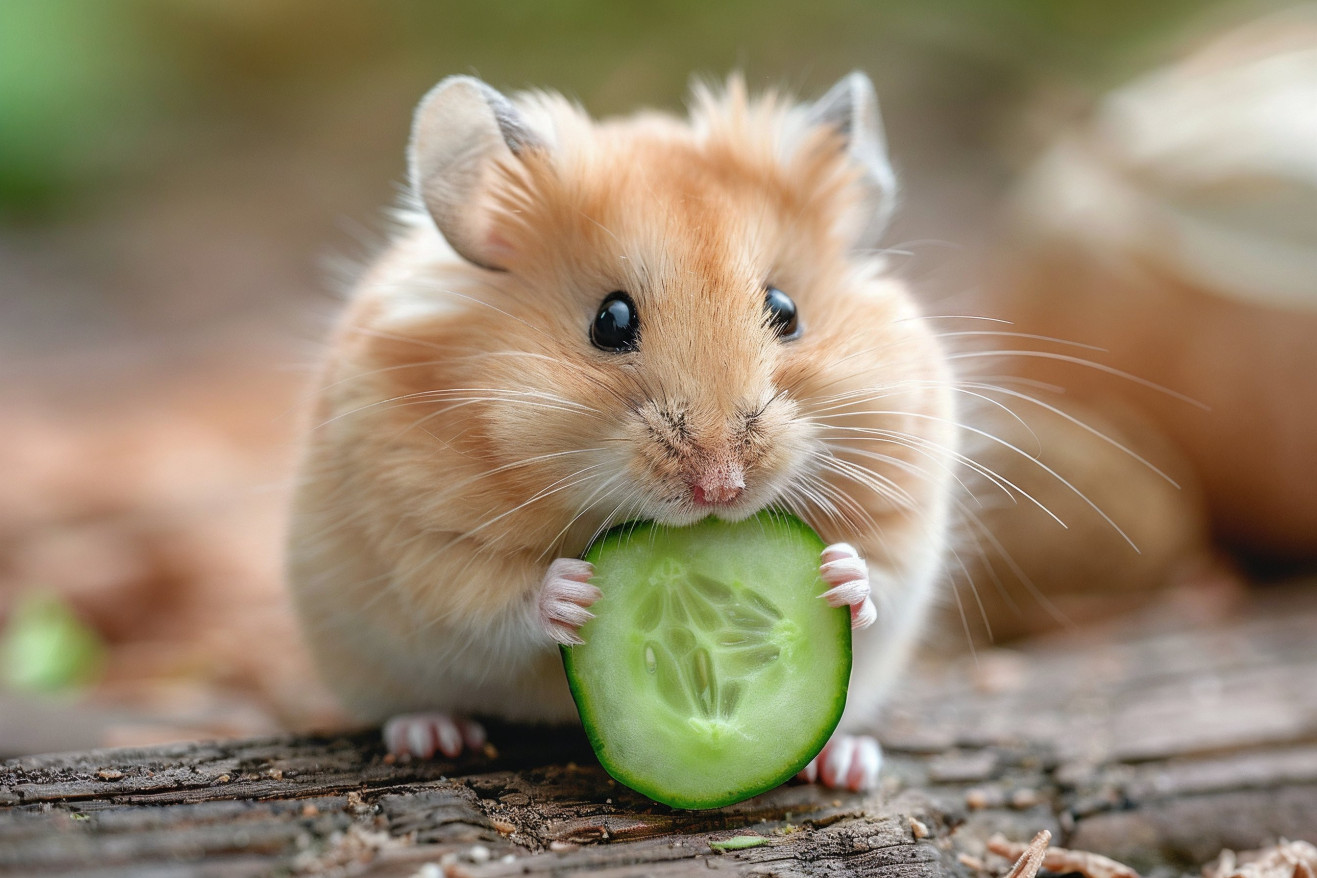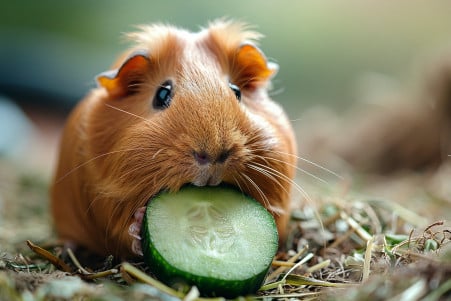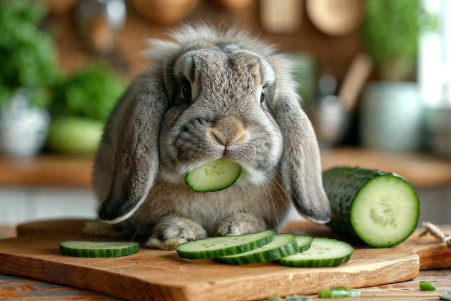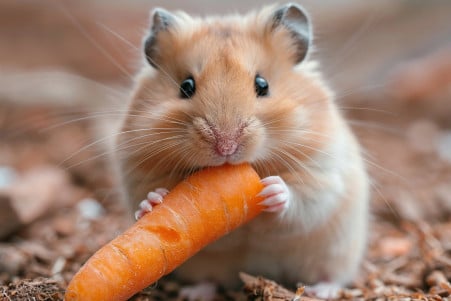Can Hamsters Eat Cucumbers? A Guide to Safe Snacking for Your Pet
12 March 2024 • Updated 11 March 2024

Cucumbers are a cool, refreshing snack, but can you share them with your hamster? The answer is yes, hamsters can eat cucumbers and they can benefit from the hydration and vitamins and minerals that cucumbers provide.
However, it’s important to feed them in moderation to avoid digestive issues. It’s also a good idea to wash them well or even peel them to remove any pesticides. Finally, it’s best to introduce cucumbers to your hamster’s diet gradually so you can watch for any negative side effects.
To answer this question and more, this article draws on a range of scientific disciplines, including veterinary research, animal nutrition research, and comparative biology. This evidence-based approach will cover expert opinions and research findings to ensure you get a complete picture of whether or not cucumbers are a good choice for your hamster.
You’ll learn about the pros and cons of feeding cucumbers to your hamster, so you can make the best choice for your pet’s well-being.
Can hamsters eat cucumbers?
Cucumbers: A Water-Rich, Nutrient-Dense Snack for Hamsters
According to Healthline, cucumbers are a great way to give your hamster a snack that will help keep them hydrated, as they are made up of 96% water. This water content, combined with the low calories in the fruit, means that cucumbers can be a good way to help your hamster stay hydrated without the risk of weight gain.
Nutritional overviews from Healthline and Medical News Today note that cucumbers are also a good source of a number of nutrients, including important vitamins like vitamin K and vitamin C, and essential minerals like potassium and magnesium.
These vitamins and minerals can help support a number of different aspects of your hamster’s health. For example, vitamin K is important for bone health because it helps with blood clotting, which may also help support the strength of the skeleton. Meanwhile, the potassium in cucumbers may help support heart health by helping to ensure the heart can function properly.
Research published in PMC shows that the antioxidants in cucumbers, which include flavonoids and tannins, may help protect cells from oxidative damage. This may be especially important for hamsters, who are small and may be more susceptible to the effects of stress.
That said, cucumbers should be used as a way to help manage your hamster’s weight, not as a way to ensure they get all the nutrients they need. Because cucumbers are low in calories, they don’t provide the same level of nutrition that other, more calorie-dense foods do, which is what hamsters need to get the energy and nutrients they need to stay healthy.
That said, giving your hamster cucumbers can be a great way to help ensure they get the vitamins and hydration they need, as long as you do it in a way that takes their overall dietary needs into account.
How to Safely Add Cucumbers to Your Hamster’s Diet
While adding cucumbers to your hamster’s diet can be a fun way to mix things up, it should be done with care. The PDSA notes that any new food, including cucumbers, should be introduced in small amounts.
You can start by adding a small piece of cucumber to your hamster’s regular meal, which will help them get used to the new flavor and texture. Keep an eye on your pet for any signs of intolerance or allergies, like diarrhea or skin issues.
When it comes to serving sizes, the key is to keep it small. The Humane Society explains that small servings of fruits and vegetables, including cucumbers, should be given to hamsters daily to help ensure a well-rounded diet. To make sure that your hamster isn’t consuming too many pesticides, make sure to wash and, if possible, peel the cucumbers before serving them.
Vets and animal nutritionists agree that a varied diet is important for hamsters, and they recommend feeding them a combination of pellet food and the occasional fresh treat like cucumbers to help ensure that they get all of the nutrients they need. By following these tips and paying close attention to your hamster’s reaction to cucumbers, you can help make the transition easier and improve their diet.
How to Make Sure Your Hamster Stays Hydrated With Cucumbers
Keeping your hamster hydrated is important for their overall health, and adding water-filled foods like cucumbers to their diet can help. According to the People’s Dispensary for Sick Animals, hamsters need about 10 milliliters of water per 100 grams of body weight each day. Since cucumbers are made up of mostly water, they can help your hamster meet this requirement while also giving them important nutrients.
That said, it’s important to make sure your hamster’s water intake is in balance so they don’t experience side effects like diarrhea, which can be caused by overhydration and can lead to dehydration.
An article on Pets on Mom.com suggests that you should always make sure your hamster has fresh water available in addition to water-rich treats like cucumbers and that you change the water daily to prevent water bottles from getting clogged or contaminated.
According to WikiHow, you should also watch for signs of dehydration in your hamster, including sunken eyes, lethargy, and dry mucous membranes. If you notice any of these symptoms, make sure to take your hamster to the vet right away. However, if you catch these symptoms early and make sure your hamster has a good mix of fresh water and hydrating foods, you can make sure they stay well-hydrated and enjoy a diverse diet.
Hamster Digestive Health: How Cucumbers Can Help
The hamster digestive system is designed to handle a wide range of foods, including animal proteins and plants. According to Zooplus Magazine, hamsters are omnivores with a digestive system that is especially good at breaking down grains and vegetables. Their sharp incisors and molars help them cut and grind their food and manage roughage, while their two-part stomach—made up of a forestomach and a glandular stomach—helps them digest it.
Cucumbers can be a good addition to a hamster’s diet because of their high water content, but it’s important to make sure that you’re not overdoing it. While the water in cucumbers can help with hydration, it can also lead to diarrhea, which is a common problem in hamsters, according to the Merck Veterinary Manual.
Diarrhea in hamsters can disrupt the normal bacterial fermentation in the appendix, which is important for extracting energy from fibrous plant material.
To make sure that your hamster’s digestive system stays healthy, it’s important to make sure that they’re eating a balanced diet that includes a mix of pellets, animal proteins, and vegetables like cucumbers.
To make sure that any changes to their diet are made gradually so that their digestive system can adjust. It’s also important to make sure that your hamster is eating a consistent diet to avoid common problems like proliferative ileitis and Tyzzer disease, which are often caused by sudden changes in diet or unsanitary living conditions.
Keeping your hamster’s living area clean and monitoring how they react to new foods are important parts of making sure that your hamster’s digestive health is maintained.
How to Make Sure Your Hamster Has a Balanced Diet
Knowing what hamsters need in their diet can help you make sure that your pet is healthy. According to the RSPCA, a balanced hamster diet includes a combination of commercial pellets, a variety of seeds, and small amounts of fruits and vegetables.
Commercial pellets are a good base for a hamster’s diet because they are designed to meet all of the animal’s nutritional needs. However, adding fresh foods like cucumbers can help ensure that your pet gets the variety and extra nutrients that it needs.
Cucumbers can be a good addition to a hamster’s diet because they are hydrating and can help balance out the dry foods that the animal eats.
According to UK Pet Food, treats like small pieces of fruits or vegetables can help ensure that your pet’s diet is varied and that it gets all of the nutrients that it needs. However, it’s important to remember that these treats should be given in moderation to avoid digestive problems.
Cucumbers can be paired with root vegetables, apple pieces, and some leafy greens after they’ve been washed to make sure that your pet’s diet is varied and balanced.
When you’re thinking about what to feed your pet, it’s important to think about what the science and veterinary communities have to say on the topic. Both sources agree that a varied diet is essential and that certain foods, like grapes and rhubarb, should be avoided. By keeping these things in mind, you can make sure that your pet’s diet is as healthy as possible.
Conclusion: Can Hamsters Eat Cucumbers?
Throughout our exploration of whether or not hamsters can eat cucumbers, we’ve learned that these fruits can be a part of a hamster’s diet. Cucumbers are low in calories, packed with essential nutrients, and have a high water content, so they can be a great way to help your hamster stay hydrated.
That said, it’s important to feed them to your pet in moderation and with a slow, careful introduction to avoid any tummy troubles.
As we’ve noted, the nutritional properties of cucumbers, including their ability to help your hamster stay hydrated and support their joint health, can help support your pet’s health. That said, cucumbers should be part of a diet that also includes other fresh fruits and veggies and nutritionally complete pellets.
It’s important to know and meet the specific dietary needs of your pets. If you’re ever unsure about what to feed your hamster, it’s best to talk to a vet to get personalized advice that takes your pet’s unique needs into account. After all, a well-balanced diet is an important part of ensuring that your hamster is happy and healthy.


